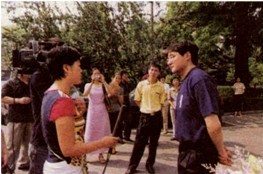人教高中英语高二上UNIT2-1
搜索关注在线英语听力室公众号:tingroom,领取免费英语资料大礼包。
(单词翻译)

 Newspapers and other media1 do more than simply record what happens. Experienced2 editors and reporters make informed decisions about what events to report and how to report them. They also make sure that readers can relate to the stories. We asked two of China's many talented journalists, Chen Ying and Zhu Lin, to tell us more about news and newspapers. The two reporters agreed to switch3 roles for once and be the interviewees4 rather than the interviewers5 in order to let us know about their work and how the news we read is made.
Newspapers and other media1 do more than simply record what happens. Experienced2 editors and reporters make informed decisions about what events to report and how to report them. They also make sure that readers can relate to the stories. We asked two of China's many talented journalists, Chen Ying and Zhu Lin, to tell us more about news and newspapers. The two reporters agreed to switch3 roles for once and be the interviewees4 rather than the interviewers5 in order to let us know about their work and how the news we read is made.
Q: How do you decide what you are going to write?
ZHU LIN: Before I decide what I'm going to write, I have to discuss the article with my editor. He listens to my ideas and gives me his suggestions. For long and important articles, for example a feature story, the editor will tell me how I should develop the story. The editor's job is to keep the newspaper balanced and interesting to the readers.
CHEN YING: Much of a reporter's work is done before he or she actually starts writing. A reporter begins by contacting the people to be interviewed and then prepares questions. Interviewing someone is difficult. A reporter must know how to ask the fight questions and how to get people to talk about the topic. After the interview, the reporter must present the material in an organised way and make sure that the article reflects events and opinions truthfully.
Q: Which of the articles that you have written do you like best?
CHEN YING: My favourite article is the one I wrote about the efforts to bring stolen cultural relics6 back to China. To write this story, I had to contact famous museums around the world and interview both Chinese and international experts in the field. I like the article because it's both news and an interesting story.
ZHU LIN: Even though I have interviewed many famous people, the story I like best is about an ordinary young woman who tried to adapt to her new life after having studied abroad. I like the story because it was the first time that I had written with real passion7 and because it made me realise8 that everyone's life is different.
Q: If you could write any article you want, what would you write about and why?
ZHU LIN: I want to explore the mysteries in life. I would like to write about music, art, nature and the importance of spiritual9 fulfilment.
CHEN YING: I want to write about people you seldom read about, for example people who have AIDS or who are addicted10 to drugs. Their stories must be told if we want to solve difficult social problems and help those who suffer from them. For a reporter, the basic task is to report an event truthfully. We shouldn't ignore what happens even if it is difficult for people to accept some stories.
The media can often help solve problems and draw attention to situations where help is needed. For example, newspapers like China Daily or The People's Daily help us understand what life is like in other parts of China and the rest of the world. Carefully written articles can help people become interested in important questions around the world. TV programmes and printed articles also help people in other countries learn about China and the Chinese people. The result is a better understanding of the world on all sides, leading to a future world where people from all countries are respected and different views and opinions are tolerated11.




